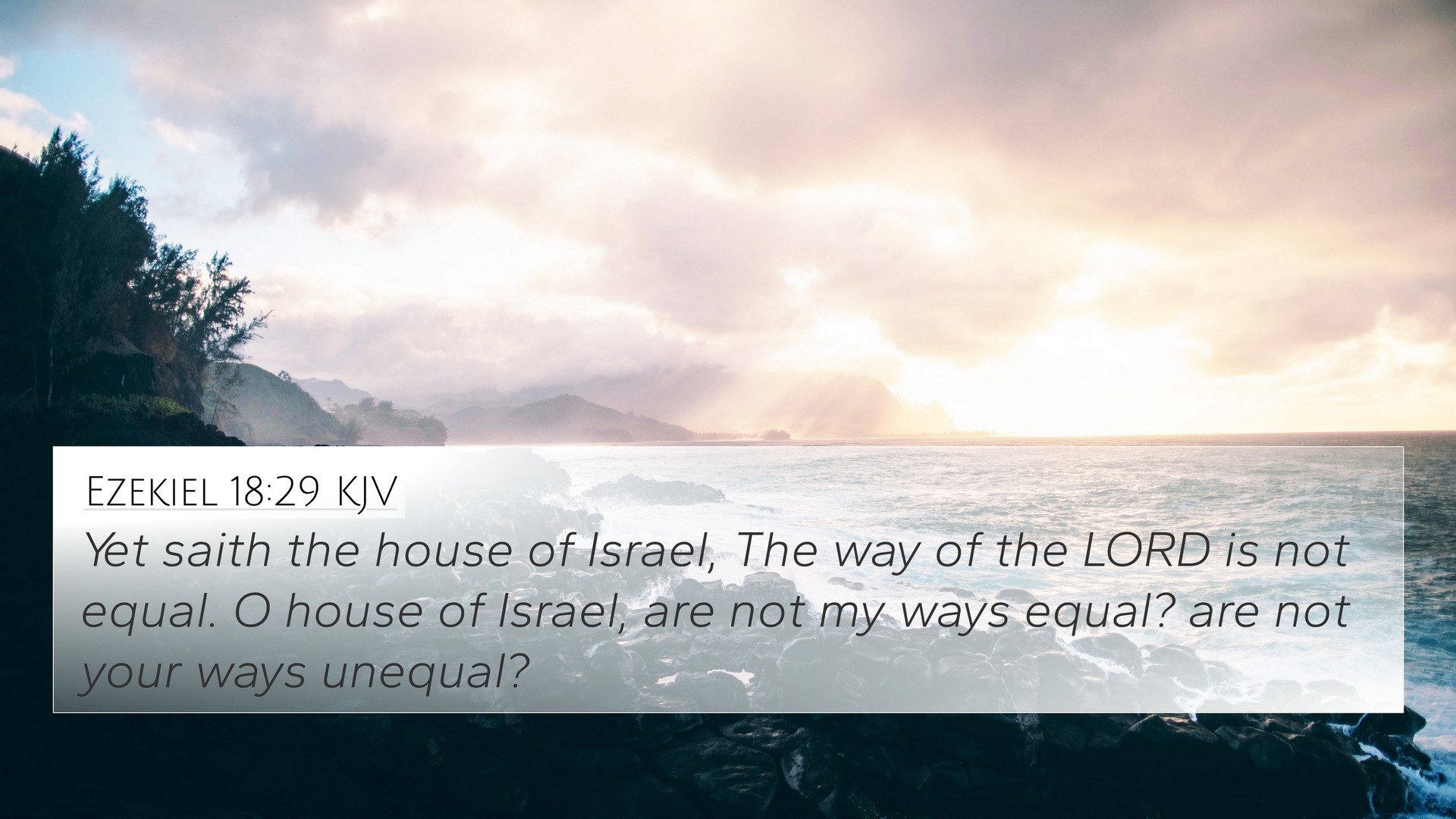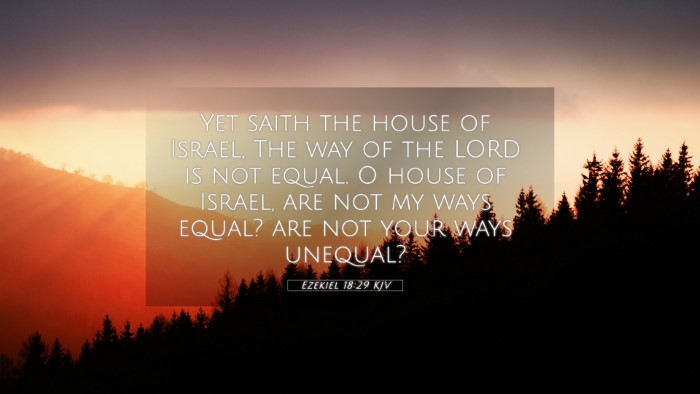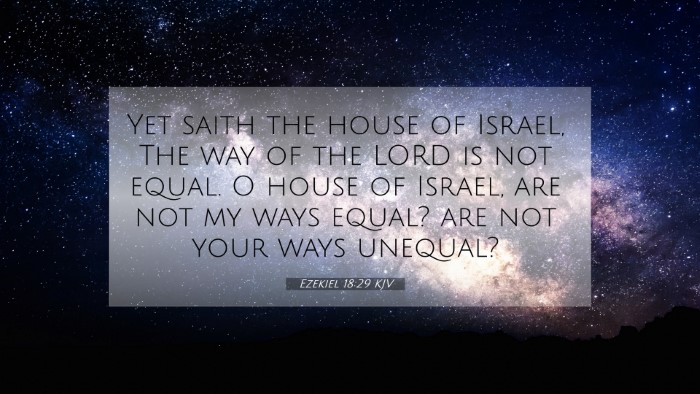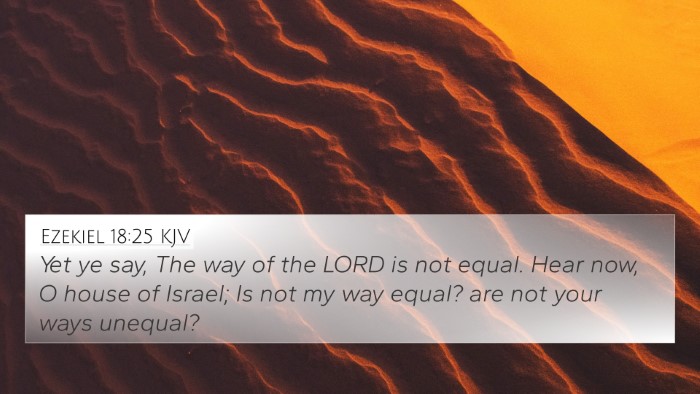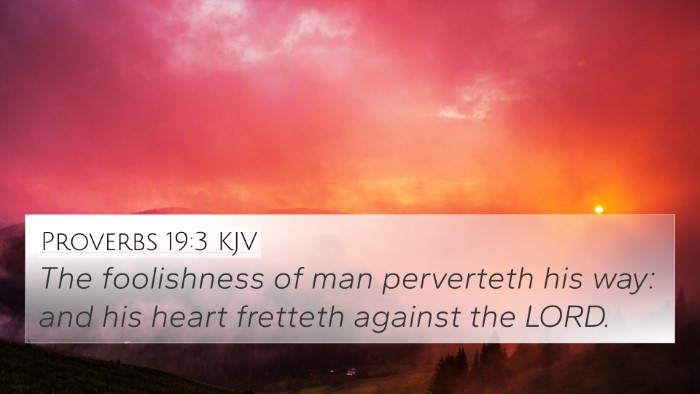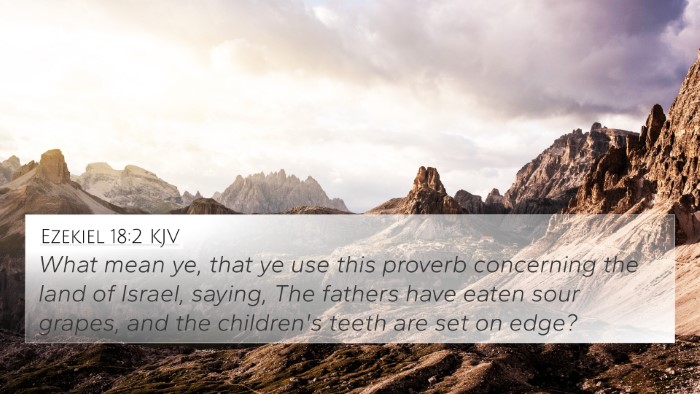Ezekiel 18:29 - Verse Meaning and Interpretation
Bible Verse: "Yet saith the house of Israel, The way of the Lord is not equal. O house of Israel, are not my ways equal? are not your ways unequal?" (Ezekiel 18:29)
Contextual Overview
This verse comes in a broader context of God addressing the house of Israel through the prophet Ezekiel, rebuking their complaints about His justice. The Israelites are misunderstanding divine justice, claiming that God's ways are unfair while failing to recognize their own inequities.
Summarized Insights from Public Domain Commentaries
-
Matthew Henry:
Henry emphasizes that the people of Israel were accusing God of being unjust. They are reminded that God's judgments are fair, and it is their own actions that reveal their unrighteousness. God's ways are equal; it is their perspective that is skewed.
-
Albert Barnes:
Barnes notes that the complaints from Israel reflect a common human tendency to blame God for one's misfortunes while ignoring personal responsibility. He stresses that God’s divine justice does not fail and that His judgments are based on righteousness, thereby encouraging repentance instead of grumbling.
-
Adam Clarke:
Clarke elaborates on the nature of God’s ways being just and that the onus lies on Israel to recognize their own failings. He points out that divine justice is absolute, and the analogy of paths represents how men wander away from God's commands, leading to their ruin, not God's inequity.
Interpretation and Application
The overarching theme of Ezekiel 18:29 is about recognizing personal accountability in one’s relationship with God. The Israelites were inclined to view themselves as victims of God’s alleged injustice rather than as individuals responsible for their sins. This verse invites readers to:
- Reflect on God's consistent fairness
- Examine personal ways that may be contrary to God's precepts
- Encourage others to seek alignment with divine principles rather than complain about God's sovereign decisions
Bible Verse Cross-References
To gain a deeper understanding of Ezekiel 18:29, here are some related scripture references:
- Deuteronomy 32:4 - God is referred to as the Rock, His work is perfect, highlighting His just nature.
- Isaiah 55:8-9 - God's thoughts and ways are higher than human thoughts, encouraging trust in His justice.
- Romans 2:6-8 - Illustrates the principle of divine judgment according to individual deeds.
- Galatians 6:7 - A reminder that we will reap what we sow, reinforcing personal responsibility.
- Isaiah 30:18 - Speaks of the Lord's justice and the grace extended to those who wait for Him.
- Psalm 145:17 - Declares that the Lord is righteous in all His ways and faithful in all His works.
- John 7:24 - Jesus teaches not to judge by appearances, but to judge with righteous judgment.
- James 1:17 - God does not change like shifting shadows, emphasizing His consistent nature.
- Micah 6:8 - Outlines what God requires: to act justly, love mercy, and walk humbly with Him.
- Ezekiel 33:11 - God’s desire for sinners to turn from their ways rather than perish.
Thematic Connections Between Bible Verses
Examining Ezekiel 18:29 reveals thematic connections prevalent throughout Scripture:
- Divine Justice: The fairness of God's judgments is a consistent theme; for example, 2 Thessalonians 1:6 speaks to God repaying with affliction those who afflict others.
- Personal Responsibility: Emphasized in texts such as Ezekiel 33:20, where individuals are held accountable for their actions rather than the collective guilt of a community.
- God’s Unchanging Nature: Relates to Hebrews 13:8, where Jesus Christ is noted as the same yesterday, today, and forever, demonstrating God's eternal justice and love.
Tools for Bible Cross-Referencing
To further understand Bible verses and their connections, consider utilizing various tools:
- Bible Concordance: Helps locate verses based on keywords.
- Bible Cross-reference Guide: Provides a systematic way to see connections between verses.
- Cross-reference Bible Study: Encourages deeper engagement with related scriptures.
- Bible Chain References: Links verses together around core themes for cohesive study.
Conclusion
Ezekiel 18:29 challenges readers to confront their perceptions of God and justice while emphasizing the importance of personal accountability. This verse’s connection to other Biblical texts on justice, righteousness, and divine nature enriches its meaning and relevance today. Engaging with these cross-references and utilizing study tools can enhance understanding and application of God’s truth in our lives.
